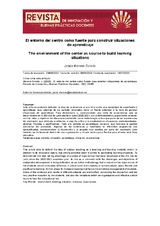Mostrar el registro sencillo del ítem
El entorno del centro como fuente para construir situaciones de aprendizaje
| dc.contributor.author | Moreno Oviedo, Jesús | |
| dc.date.accessioned | 2023-12-12T08:19:11Z | |
| dc.date.available | 2023-12-12T08:19:11Z | |
| dc.date.issued | 2023 | |
| dc.identifier.issn | 2531-1336 | |
| dc.identifier.uri | http://hdl.handle.net/10396/26318 | |
| dc.description.abstract | Este artículo pretende defender la idea de la docencia al aire libre como una modalidad de enseñanza y aprendizaje, que, además de su carácter innovador, tiene un fuerte potencial a la hora de generar situaciones de aprendizaje. Para demostrarlo y, aprovechando una serie de experiencias que se desarrollaron en el IES Isla de León desde el curso 2020-2021, se va defendiendo su papel como conector con los retos y objetivos del desarrollo sostenible, como metodología activa que parte de las experiencias del alumnado, que estimula la reflexión, el espíritu crítico y la creatividad en situaciones contextualizadas, abiertas, flexibles y significativas. Todo ello permite un aprendizaje inclusivo, que favorece la gestión emocional del alumnado. Algunas de las evidencias y resultados en diferentes asignaturas son ejemplificadas, concluyéndose la disposición y la acogida muy positiva por parte del alumnado, pero también las limitaciones dentro de una organización y horario lectivo poco flexible para afrontar esta línea educativa. | es_ES |
| dc.description.abstract | This article aims to defend the idea of outdoor teaching as a teaching and learning modality, which, in addition to its innovative nature, has strong potential when it comes to generating learning situations. To demonstrate this and, taking advantage of a series of experiences that were developed at the IES Isla de León since the 2020-2021 academic year, its role as a connector with the challenges and objectives of sustainable development is being defended, as an active methodology that is based on the experiences of the students, which stimulates reflection, a critical spirit and creativity in contextualised, open, flexible and significant situations. All this allows for inclusive learning that favors the emotional management of students. Some of the evidence and results in different subjects are exemplified, concluding the disposition and the very positive reception by the students, but also the limitations within an organization and inflexible school hours to face this educational line. | es_ES |
| dc.format.mimetype | application/pdf | es_ES |
| dc.language.iso | spa | es_ES |
| dc.publisher | UCOPress | es_ES |
| dc.rights | https://creativecommons.org/licenses/by-nc-nd/4.0/ | es_ES |
| dc.source | Revista de Innovación y Buenas Prácticas Docentes, 12(2), 53-60 | es_ES |
| dc.subject | Entorno | es_ES |
| dc.subject | Situación | es_ES |
| dc.subject | Aprendizaje | es_ES |
| dc.subject | Inclusivo | es_ES |
| dc.subject | Experiencias | es_ES |
| dc.subject | Environment | es_ES |
| dc.subject | Learning | es_ES |
| dc.subject | Situation | es_ES |
| dc.subject | Inclusive | es_ES |
| dc.subject | Experiences | es_ES |
| dc.title | El entorno del centro como fuente para construir situaciones de aprendizaje | es_ES |
| dc.title.alternative | The environment of the center as source to build learning situations | es_ES |
| dc.type | info:eu-repo/semantics/article | es_ES |
| dc.relation.publisherversion | http://www.uco.es/ucopress/ojs/index.php/ripadoc/index | es_ES |
| dc.rights.accessRights | info:eu-repo/semantics/openAccess | es_ES |

